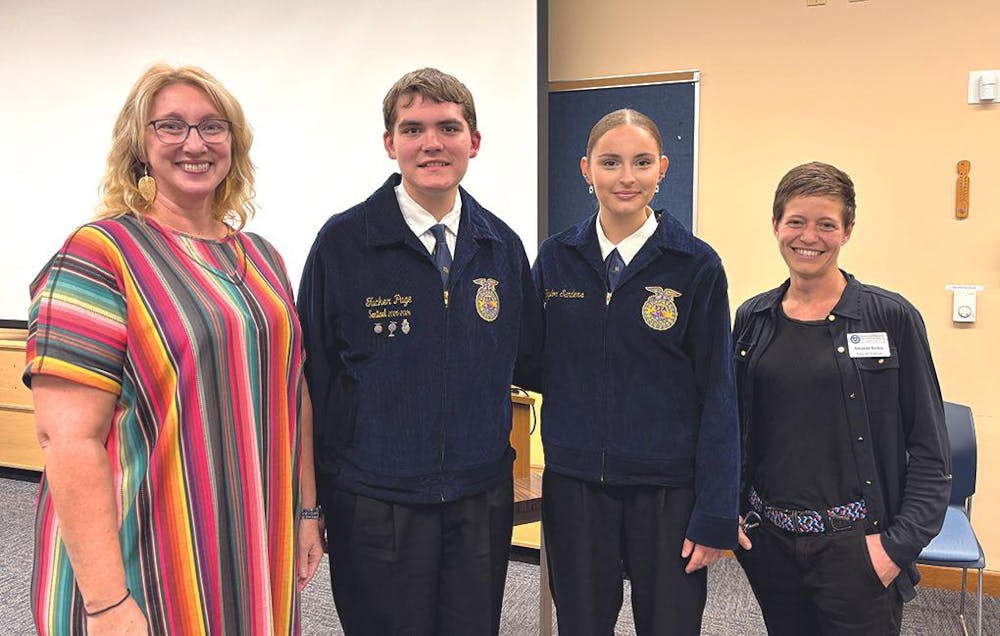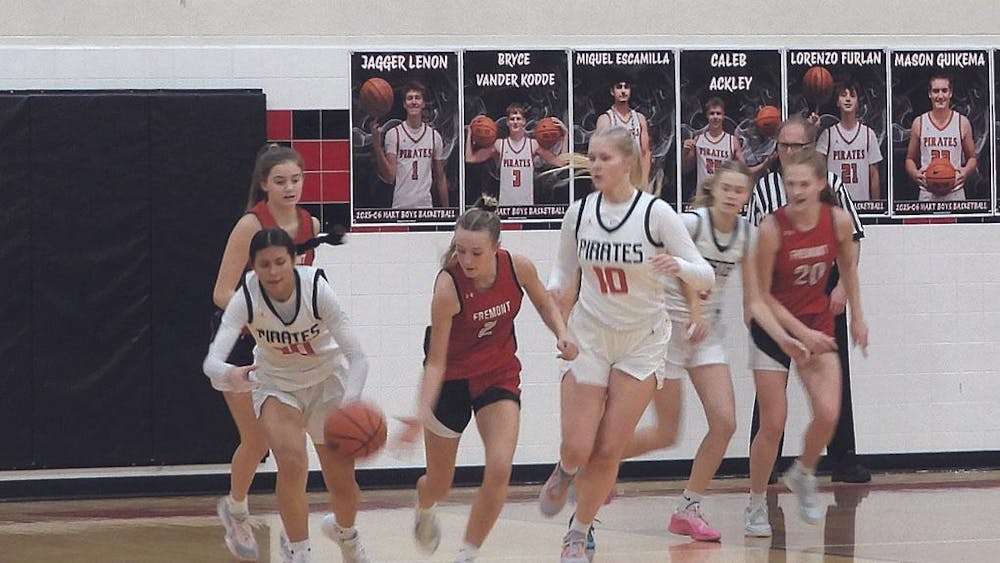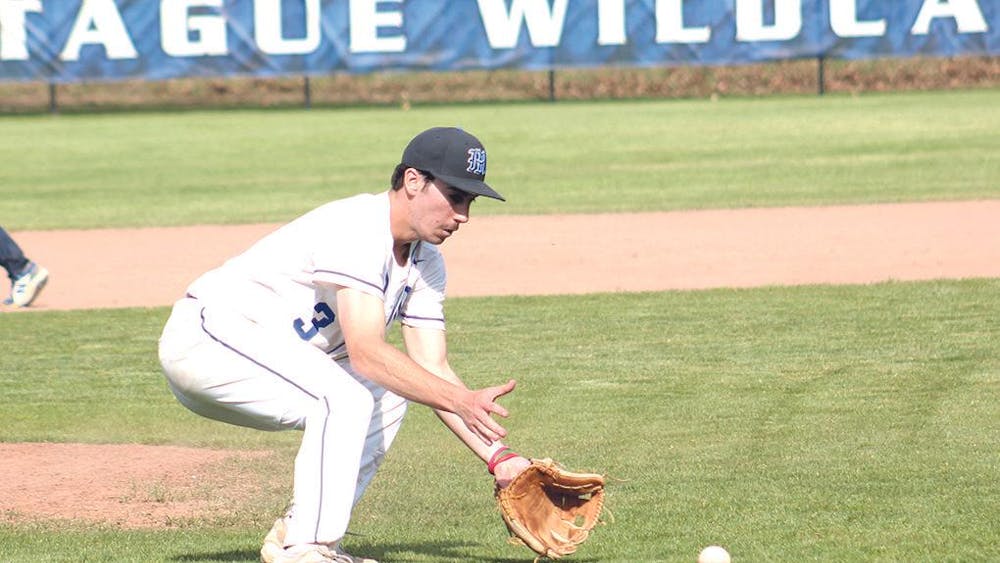WHITEHALL — White Lake Community Library, in collaboration with the Muskegon Area District and Hackley Libraries, hosted “Currents of Change" Wednesday, Sept. 17, the first program in the three-part “Shared Water” series, intended to foster community discussion surrounding the natural water resources cherished by Muskegon County.
The program opened with a presentation from Ravenna High School’s FFA “Stream Team” about their data-collection and water-monitoring project of Crockery Creek. The FFA’s wildlife biology class - represented at the presentation by Ravenna juniors Tucker Page and Taylor Sanders - is taught by agricultural science teacher Melanie Block and received guidance from Dr. Amanda Buday, associate professor at GVSU’s Annis Water Resources Institute.
The genesis of the Crockery Creek project came from a survey conducted by Dr. Buday among residents of the creek’s watershed meant to better understand the community’s interactions with the water and their areas of concerns.
As Buday explained, “One of the things I was hearing from people was that this was a really cherished local trout stream, but there was this sense that nobody cared about it, that it had kind of fallen to the wayside, that it really wasn’t getting much attention.”
This led Buday to partner with Melanie Block and the Ravenna FFA program to lead a project in which the students would compile consistent data on the salinity, turbidity, flow rate, conductivity, temperature, pH, and micro-invertebrates at four individual testing spots on Crockery Creek, beginning in the 2022-23 school year.
“These students are particularly well-suited to doing the kind of work that’s needed to start building a local data source that community members can consult,” said Buday of her intention of involving Muskegon County area high schoolers.
Block discussed the challenges faced in their first year of testing, as well as the instruction given by Buday and GVSU graduate students.
Of the first year’s learning experience, Block said, “We did a couple of things differently that first year because we were kind of learning as we went, which is exactly what FFA does. FFA’s motto is ‘Learning by doing.’ So we got in the water and started learning how to do things.”
Following the first year of data collection, the FFA approached the community through the Muskegon County Conservation District and received feedback on what aspects of water quality to focus on. The project has also received support from the community in the form of sponsorships for equipment integral to ensuring quality monitoring of the water.
FFA students Page and Sanders took turns discussing the processes of their field-work and sharing their findings with the audience. They also explained the benefits awarded to them through the participation in the dozen or so classes Ravenna’s FFA program offers, covering a variety of topics from ecology to animal raising to botany. These FFA program classes, in which 237 students are enrolled, give students a hands-on learning experience, award college science credits, and take them around and outside of the state of Michigan to compete in FFA events.
As Block explained, “It’s basically following our educational standards with a really cool project that matters to our community.”
Following Ravenna’s FFA presentation, the discussion of community and the interconnectivity of people and waterways continued through the Currents of Change panel. On the panel, which was moderated by WLCL board member and local activist Norm Kittleson, were three experienced individuals whose life’s work revolved around water protection and management. Dr. Richard Rediske is a professor emeritus of GVSU’s Water Resources Institute and consultant, who spent many years helping to delist White Lake as an EPA area of concern. Erick Elgin works for Michigan State University Extension, particularly for the concerns of inland lakes and streams, focusing on the “intersection of ecology and people.” Jill Ryan is the executive director of Freshwater Future, an organization created to “help communities protect the Great Lakes across the whole Great Lakes region.” Freshwater Future works with about 2,000 communities across US and Canada to provide assistance for funding, non-profit consultation, policy-making, and lake rehabilitation and restoration projects, such as those for Muskegon and White Lakes.
Kittleson provided a list of questions for the panel to answer, which primarily focused on the effects humanity can have on waterways and what can be done to make compromises between community development and ecological restoration and preservation.
The panel discussed the importance of water in human development, especially as it pertains to Michigan’s history, with Ryan pointing out how the Great Lakes region, spanning the U.S. and Canada “have the third largest economy in the world.”
“[It’s because of the water] we were able to develop so much industry here,” Ryan said, ranging from commerce, shipping, manufacturing and agriculture. “The water both shapes us and we shape water.”
Elgin also discussed Michigan’s importance in the scope of water as a recreational activity, the evolution of small seasonal communities to large municipalities, and the effects these developments have on the environment.
“[Before the Clean Water Act] we were manipulating our shorelines considerably for residential development,” Elgin said.
“We have tremendously altered our landscape,” agreed Dr. Rediske, particularly of the disruption of various aspects of animal and hydrological cycles, delicate systems in their own rights.
The panel was also open to questions from the audience, many of which were focused on local examples of development of overtaking and restoration of waterways - such as at Tannery Bay, hydroelectric dams, and the remediation of White Lake wetlands’ old celery fields - of which the panel and other audience members opened dialogue of what policies are in place and what procedures can be taken to minimize the effect on local ecosystems.
Most of all, the audience wanted to know one thing: “What can we, as community members, do to help?”
Across the board, the panelists recommended involvement on the local level through lake associations, conservation districts, and local government. Rediske, who has participated in planning commissions throughout the years, advocated for just that - ““If you’re interested in conservation, be on the planning commission. That’s a great way to get people to think about conservation before development comes in… Our local government depends on informed citizens and citizen participation.”
Elgin spoke of the "cumulative effects” of individuals, and the power we all have in making choices that are less intrusive to the environment. Even something as simple as trimming a tree instead of removing it altogether or planting native flora to prevent erosion, can make a great impact.
“Being engaged is so critically important,” said Ryan, who urged community members to stay involved and informed.
The hope is that the government will work to balance the interests of industry and development with the concerns of residents and local advocacy groups, and that concerned community members will work to enforce that balance.
“We’re all responsible for this place we live, [and] we live in this really special place," Ryan said. "We’re stewards of this place and stewards of this water. So I just encourage you to keep your interest up and do what you think is protective for your area.”













